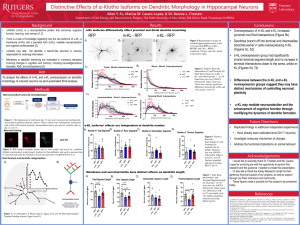Fu, Allen: Distinctive Effects of Alpha-Klotho Isoforms on Dendritic Morphology in Hippocampal Neurons

Title: Distinctive Effects of Alpha-Klotho Isoforms on Dendritic Morphology in Hippocampal Neurons
Name: Allen Fu
Major: Cell Biology and Neuroscience
School affiliation: School of Arts and Sciences
Programs: Aresty Summer Science Program
Other contributors: Marina M. Cararo-Lopes, Dr. Bonnie L. FIrestein
Abstract: Alterations in dendritic morphology have been implicated in numerous brain disorders
involving changes in cognition and memory, and are crucial to the ability of neurons to receive and transmit information. ⍺-Klotho is a protein linked to the prevention of aging in mice and humans and has been found to mediate neuroprotection and enhancement of cognitive function. The klotho gene transcribes two distinct mRNAs which will generate the secreted form (s-KL) and the membrane form (m-KL). However, there is a lack of knowledge concerning the specific roles of m-KL and s-KL in the brain. Here, we aim to examine how m-KL and s-KL affect dendritic branching in cultured rat neurons. Primary hippocampal cultures were transfected to overexpress m-KL and RFP, s-KL and RFP, or only RFP as a control. 14 days after transfection, the neurons were fixed, visualized using immunofluorescence, and subsequently traced and analyzed using the BONFIRE program. Sholl analysis demonstrates that m-KL, and to a lesser extent s-KL, increases the number of dendritic intersections near the soma but decreases the number of intersections further from the soma. This data supports the hypothesis that ⍺-Klotho may alter the dynamics of dendritic branching, and that m-KL and s-KL can modulate neuronal function through distinct mechanisms. The effects of ⍺-Klotho in dendritic branching provides a potential explanation of this protein’s ability to mediate neuroprotection and enhance cognitive function. These encouraging preliminary findings invite further investigation into the roles m-KL and s-KL play in the function and morphology of neurons.